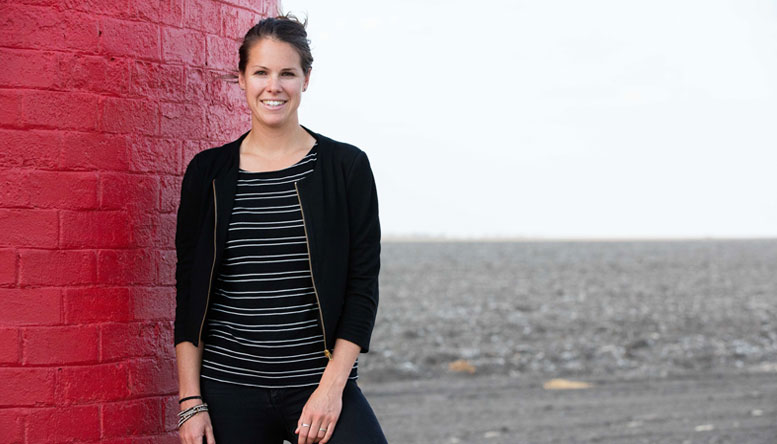Sarah Nolet: MIT Alumni Tackling Food and Water Challenges After Graduation
SDM ’16 | Founder of AgThentic; Co-Founder of Tenacious Ventures

With the support, capital, and connections that her companies can provide, Sarah is optimistic both about the companies that they are investing in and about the future of food. Credit: Sarah Nolet
Sarah Nolet is a wearer of many hats. Since graduating from MIT in 2016 with a master’s degree from the School of Engineering in systems engineering and management and a certificate in sustainability from the Sustainability Initiative at the Sloan School of Management, she has moved to Sydney, Australia and started three separate companies and a podcast, all focused on agriculture. Her first venture was AgThentic—a consulting and advisory firm for agriculture technologies which she founded in 2016. While continuing her work as CEO and founder of AgThentic, she co-founded Farmers2Founders in 2018, a program that supports farmers to be involved in innovation “as more than customers.” Subsequently, Sarah went on in 2018 to co-found Tenacious Ventures, Australia’s first venture capital firm dedicated to investing in agriculture and food technologies. While managing these three ventures she still finds the time to host AgTech…So What?, a podcast dedicated to telling the stories of innovators at the intersection of agriculture and technology.
Her reason for launching all of these ventures was that, in Australia, there was very little support for ag-tech startups, despite the fact that the agriculture sector in the country is large and innovative. “When I first moved here, I realized that there wasn’t an ecosystem of support for ag-tech entrepreneurs,” she told me. So, Sarah set out to change that. “Pretty much everything that we do at the companies that I've founded involves bridging the gap between technologies and the end users in the industry,” something that Sarah thinks is critical when engineering technical solutions for agricultural industries. “A lot of current technologies are pushed into the agriculture industry instead of being pulled in to meet real consumer needs and challenges.” Her goal is to develop business models that ensure technologies actually solve real problems for users all along the value chain.
“I never thought of working in agriculture as a career; I originally set out to work in technology and thought I could do something good for the environment later in life,” Sarah said. Before applying to MIT, Sarah had worked in the US defense industry, where she developed an interest in systems and systems engineering. However, before arriving in Cambridge, Sarah spent almost a year living on farms across South America. What was initially supposed to be a two-week vacation turned into a year of homestays, and self-guided exploration and learning about local farming practices and farming communities. “That time,” she said, “opened my eyes and helped me figure out that agriculture was something I was really interested in and passionate about.” By the time she arrived at MIT she was ready to “fully dig into food and agriculture.” While at MIT she joined the MIT Food and Agriculture Club, eventually becoming the president and helping to establish the first ever Rabobank-MIT Food and Agribusiness Innovation Prize. Sarah commented that J-WAFS, a key sponsor of the event and mentor to the student producers of the prize, “was really key in making connections, facilitating different speakers, helping [the Food and Agriculture Club] with the prize and attracting support” for the event.
“The flexibility of my program at MIT really allowed me to carve together an academic plan that had a basis in systems engineering and management while also allowing me to specialize and gain industry experience in food, agriculture and sustainability,” Sarah said. It was during her time at MIT, and through the support and connections that J-WAFS offered, that she began to explore the role of corporate businesses and investors in the agriculture sector and crystalize her vision on how to build a system that supports technology and innovation. The development of this thinking has since informed the launch of both AgThentic and Tenacious Ventures, which achieved first close in early 2020 with over $20 million under management.
Today, Sarah works with corporate agriculture businesses leaders, early stage ag-tech startups, and farmers in Australia, New Zealand, and the US. Her three businesses aim not only to foster collaborative connections, but also to support “non-traditional” innovators. “When I moved here, I saw an opportunity to build entrepreneurship and innovation programs to connect farmers with innovators, and also to support farmers to become innovators themselves,” Sarah said. With the support, capital, and connections that her companies can provide, Sarah is optimistic both about the companies that they are investing in and about the future of food: “The technologies they are developing are reducing the emissions intensity of agriculture, reducing dependence on chemicals, and transforming supply chains, all while making farming more environmentally sustainable so that we can all have access to a future with affordable food.
Want to find out more about MIT alumni working in food and water? Click here.